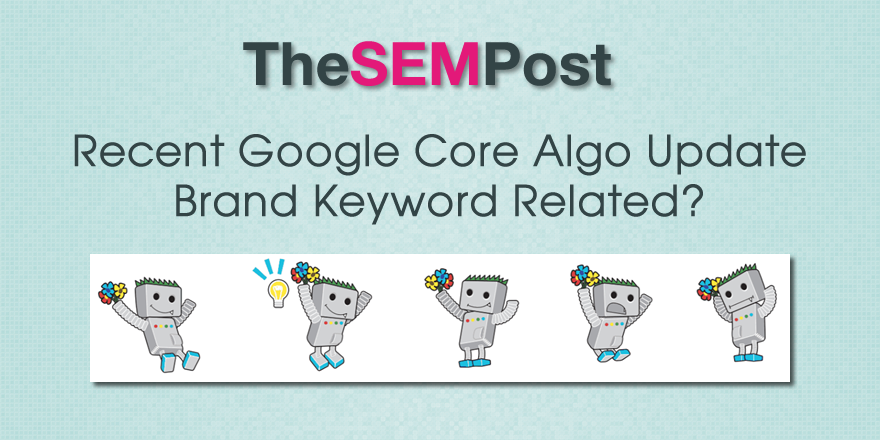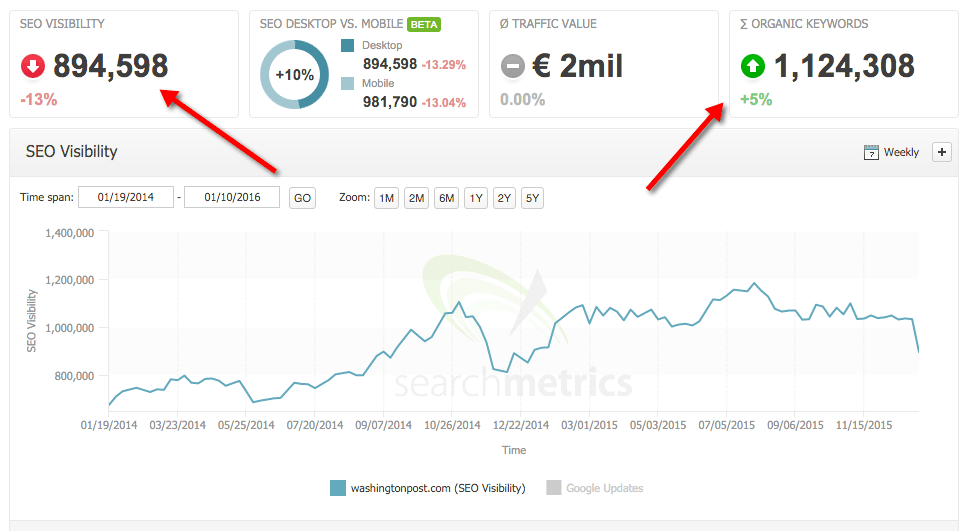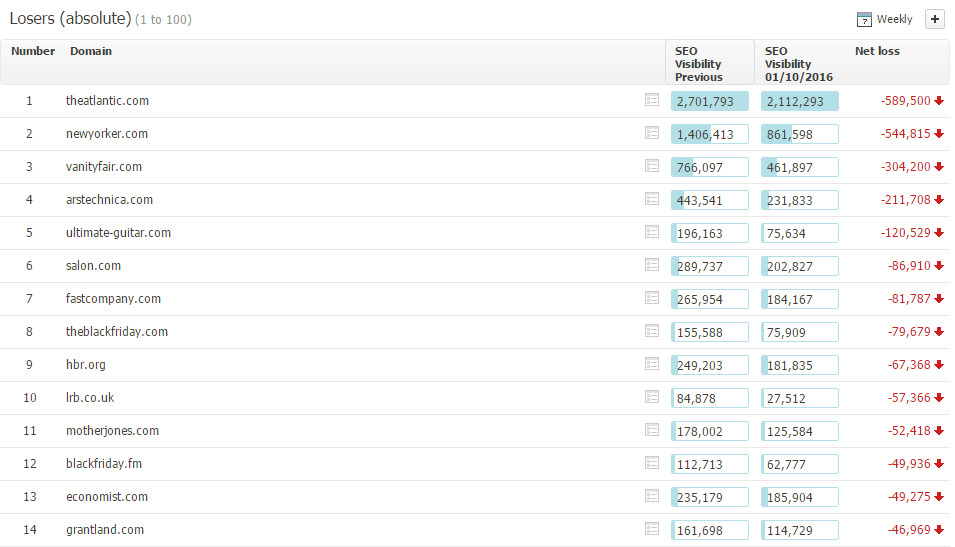 Now that the drama over “it must be Penguin!” and “it must be Panda!” has died down, we are finally hearing some more specifics about what people are seeing in regards to the recent core search results fluctuations that have been going on for just over a week.
Now that the drama over “it must be Penguin!” and “it must be Panda!” has died down, we are finally hearing some more specifics about what people are seeing in regards to the recent core search results fluctuations that have been going on for just over a week.
There were definitely signs that these changes were quality related in someway. But one analysis seems to be pointing to the fact that is is related to brand keywords and how websites that are NOT the brand are ranked for them.
Bartosz Góralewicz has a look at not just the winners and losers – something that is easy to discover – but also what those winners and losers have in common. And the one common denominator seems to be that the keywords gained and lost by the winners and losers are mostly brand keyword specific.
However, this isn’t just a case of “brands ranking higher for their keywords and other sites not ranking for those brand keywords as well.” Interestingly, some of these websites increased some brand keyword terms while dropping in others.
He also notes that there wasn’t a seemingly overall downranking of any of these particular sites. Looking the WashingtonPost.com example, while their visibility dropped, namely due to the power of brand related keywords, they actually gained more organic keywords overall.
 So this shows that even though some sites lose some of the big search keywords, overall they have significantly more keywords than previously. But obviously, how this translates into actual traffic remains to be seen.
So this shows that even though some sites lose some of the big search keywords, overall they have significantly more keywords than previously. But obviously, how this translates into actual traffic remains to be seen.
SEMRush shows a tiny drop in traffic, but nothing significant.
 The other thing noteworthy is the number of news sites impacted. You can find the full list of losers at Goralewicz’ site, but look at all the major news sites on this list.
The other thing noteworthy is the number of news sites impacted. You can find the full list of losers at Goralewicz’ site, but look at all the major news sites on this list.
There isn’t quite a full week’s of data yet, and there is definitely some fluctuations continuing, which could either be this core update being tweaked, or Google could be tweaking something else too, to keep us all on our toes. But I am sure SEOs will have a closer look at some of these brand keyword changes and seeing what else can be found on likely reasons why these brand keyword rankings changed so much.
For his full analysis, with many specific examples, you can find it here.
Jennifer Slegg
Latest posts by Jennifer Slegg (see all)
- 2022 Update for Google Quality Rater Guidelines – Big YMYL Updates - August 1, 2022
- Google Quality Rater Guidelines: The Low Quality 2021 Update - October 19, 2021
- Rethinking Affiliate Sites With Google’s Product Review Update - April 23, 2021
- New Google Quality Rater Guidelines, Update Adds Emphasis on Needs Met - October 16, 2020
- Google Updates Experiment Statistics for Quality Raters - October 6, 2020

Michael Stricker says
Thanks, Jennifer, this is the first notice I’ve read that goes beyond superficial observations. It’s quite possibly the first, “combo” of multiple overlapping updates. Personal observation: Looking like QDF may be involved, (Ecomm items for sale are subject to freshness because of price volatility.) must dig deeper and broader. Thanks for the mention!
Aaron Bradley says
Goralewicz’s analysis is yet another treatment where there’s not even been a cursory effort to define what a “brand query” or “brand keyword” is, rendering the article’s conclusions at best dubious.
Among the queries identified as “brand keywords” by Goralewicz are: maps, horoscope, calendar, pretty little liars, grey’s anatomy, robin williams, justin bieber, katy perry, angelina jolie, tom brady, barack obama, elvis presley, arnold schwarzenegger, miranda kerr, michael jackson, liam neeson, happy birthday, frozen, the walking dead, and mad max fury road.
People who happen to be celebrities are “brands”? Movies are “brands”? TV shows are “brands”?Video games are “brands”? Songs are “brands”? And omitted from my list are a huge thwack of organizations that, simply by virtue of being organizations, are “brands”: cbs news, pbs, npr, espn, fox news, nfl, ncaa.
What aren’t brands to Goralewicz? Common nouns (e.g. “dictionary”) and named geographical entities (e.g. “greece”).
It’s accurate to call everything on Goralewicz’s “brand” list a named entity, but ridiculous to pretend that anything useful is to be gleaned about “brand keywords” when a “brand keyword” is so broadly defined.
That these are named entities suggests a taxonomic scheme that might actually bear useful analytical fruit. That is, to look at the type of entities involved: say named personal entities, named corporate entities, named geographic entities, named product entities, common entities (and possibly non-entities – “things that are not nouns”). Or even to break things into the broad but readily understandable categories of “things that are proper nouns (named entities), just things (common entities) and non-things.”
But to say “brand queries” when that refers to any named Thing that’s not on a motoring roadmap is hardly helpful. 🙂
Bartosz Goralewicz says
Aaron, thank you for your comment.
I see that I marked a little bit too much on my screenshots. It is my mistake obviously and I will correct them today.
My understanding of “brand queries” includes names of the BRANDS as Google would understand it. This includes names of companies (eBay, Amazon etc.), but also names of celebrities like “Justin Bieber”. This is the pattern I see and this is what I had in mind.
Thanks for heads up Aaron.
Majidy says
Jennifer
After core ranking update, first traffic spike was higher with over all 20% now it has started downwards. What is it actually? Any specific reason?
Best,
Jennifer Slegg says
Some people reported seeing a drop yesterday. Whether it is the same change or a different one, we don’t know 🙂